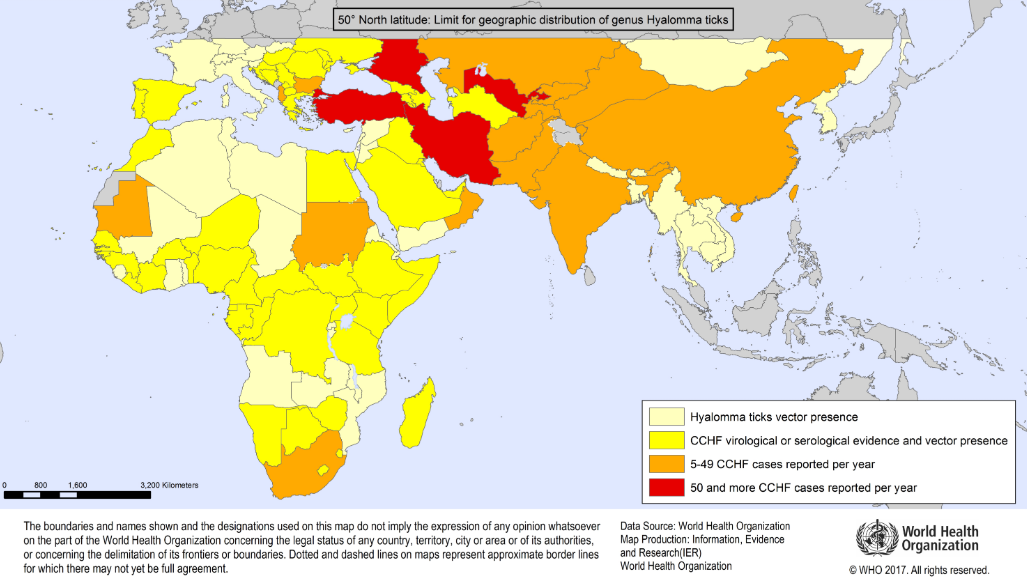Man in Spain hospitalised with tick-borne viral disease ‘fatal in about 30 per cent of cases’
Most serious symptoms include eye and skin haemorrhages, internal bleeding, and organ failure
Your support helps us to tell the story
From reproductive rights to climate change to Big Tech, The Independent is on the ground when the story is developing. Whether it's investigating the financials of Elon Musk's pro-Trump PAC or producing our latest documentary, 'The A Word', which shines a light on the American women fighting for reproductive rights, we know how important it is to parse out the facts from the messaging.
At such a critical moment in US history, we need reporters on the ground. Your donation allows us to keep sending journalists to speak to both sides of the story.
The Independent is trusted by Americans across the entire political spectrum. And unlike many other quality news outlets, we choose not to lock Americans out of our reporting and analysis with paywalls. We believe quality journalism should be available to everyone, paid for by those who can afford it.
Your support makes all the difference.A man in Spain who was bitten by a tick has been hospitalised and diagnosed with Crimean-Congo haemorrhagic fever (CCHF), a disease that can kill up to 40 per cent of people who contract it.
The patient was first admitted to a local hospital in the northwestern city of Leon. After he was then transferred to another hospital on a military plane, the Spanish defence ministry said on Thursday.
“He has a tick bite and remains in a stable condition, despite the clinical severity that this pathology implies,” health authorities in the Castile and Leon region said in a statement.
The viral disease is mainly found in Africa, the Balkans, the Middle East and Asia and more rarely in Europe.
In Europe, cases have so far been restricted to the Balkans, Russia, Spain, and Turkey – according to the European Centre of Disease Prevention and Control (ECDC).
Some cases have been reported in the UK, with the latest case in March this year involving a woman who had travelled to Afghanistan. Hers is the third known case in the UK – after cases in 2012 and 2014, that did not spread to anyone else.
The disease was first detected in Crimea in 1944. It has a fatality rate between 10 per cent and 40 cent, with an overall fatality rate of 30 per cent – according to the World Health Organisation (WHO).

Transmission of the virus between humans is by close contact with blood or bodily fluids, the WHO says.
A tick bite or contact with infected animal blood or tissue can also transmit the disease.
The Hyalomma tick – the main carrier of the disease – is not established in the UK and the virus has not been found in ticks native to the country.
The vast majority of CCHF cases are mild or asymptomatic. But symptoms can include fever, bleeding from broken capillaries on the eyes and skin, sensitivity to light, muscle ache, dizziness, vomiting, nose bleeds, bruising, and a sore throat in the early stages, which could lead to organ failure and internal bleeding.
Spain detected its first case of CCHF in 2011. In 2016, a Spanish man died after being diagnosed with the disease following a tick bite.
In 1969, some 25 years after it was first detected in Crimea, pathologists found that the disease was the same as one identified in Congo in 1956. The place names were then combined to give the virus its name.
Currently, the disease in a patient is managed with antiviral drugs, but there is no specific antiviral for CCHF or an approved vaccine.
Prevention, early diagnosis and isolating a patient from others in healthcare settings are the only ways to avoid the spread of the virus, WHO and ECDC have said.


Join our commenting forum
Join thought-provoking conversations, follow other Independent readers and see their replies
Comments